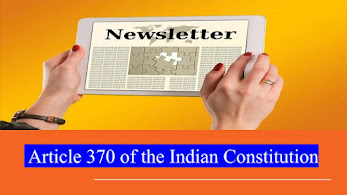Article 370 of the Indian Constitution: A Journey of Special Status and Contemporary Implications
.jpg)
Article 370 of the Indian Constitution: A Journey of Special Status and Contemporary Implications Article 370, a significant provision within the Indian Constitution, granted a special status to the region of Jammu and Kashmir (J&K). This article, often hailed as a unique and contentious constitutional provision, has undergone significant changes, leading to transformative implications, especially in the modern era. Historical Context and Special Provisions Enacted as a temporary and transitional provision, Article 370 conferred autonomy to the state of Jammu and Kashmir within the Indian Union. This provision granted the state a certain degree of autonomy in framing its own laws, with limited jurisdiction for the Indian Parliament in legislative matters. Landmark Case of Sampat Prakash v. State of Jammu and Kashmir (1970) In the case of Sampat Prakash v. State of Jammu and Kashmir (1970) , the Supreme Court upheld the special status of J&K under Article 370, acknowledging...
.jpg)
